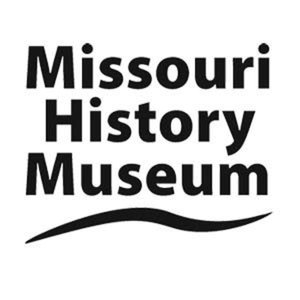Submit a Teaching Module
Submit an Item
from Apr. 19, 1865
The Murder of the President
-
Full Title
The Murder of the President
-
Description
Sermon delivered at Zion Temple on 19 April 1865. English translation by Alisa Rethy.
-
Transcription
The Murder of the President
by Rabbi Bernhard Felsenthal
In this same hour, dear friends, as we are gathered in this house, thousands of houses of God are open for the same purpose – hundreds of thousands of people are gathered for the same purpose. Just as this temple of ours is furnished with the symbols of sorrow and the emblems of grief, innumerable public and private buildings are clothed in the garb of mourning. The same feeling of deep pain which permeates the souls of all who are present here lives in the breast of millions. What, then, is the reason for the truly great, imposing and momentous mourning of the nation? – A father has been suddenly snatched from his family, the father of the fatherland has fallen by the murderer’s hand. The highest official of the land and its first and most excellent citizen has departed this life in a way never before recorded in the annals of the United States. To be sure, we have already expressed the feelings of our heart at this site twice over the course of this week. Returning to honor the great deceased once more today, we follow indeed just as much a powerful urge of our heart as we meet a demand issued upon the nation by Washington.
In this very hour, in the capital city of the Union, the mortal remains of President Lincoln are surely being transferred, in a solemn procession, from the White House to the Capitol. We here accompany the body in spirit and fulfill the duty of the Israelites, held high through all time, to honor the dead. Millions of others also follow the coffin in spirit as we do. Every eye is filled with sorrow. A magnificent funeral procession! One, the likes of which has honored only a few!
But what shining light issues forth from the deceased? We answer this with the word of the prophet:
Thy righteousness shall go before thee; the glory of God shall be thy reward. (Isaiah 58:8)
His righteousness goes before him! In the language of the Bible, “righteousness” means none other than what we now call greatness of spirit and a powerful morality, the sum of glorious and noble works. And Lincoln was great. He was great in that he 1. Undertook to complete the task that fell to him – the restoration of the union – with wisdom and steadfastness, and truly completed it; 2. In that he made the glorious principle of the emancipation proclamation – “all men are free and equal!” – a reality; and 3. In that he paired justice and steadfastness with clemency and love in every undertaking.
1. His righteousness goes before him. The glory of having restored the union goes before him. Nearly eighty years ago, in 1787, a great alliance of states was created through the acceptance of the constitution, and this alliance most gloriously rose to reveal its innate power and greatness. The Union, dear to all friends of Liberty on the earth, became an object of hatred for all enemies of Liberty, a cause of inner fear for all bearers of the crown. The star-spangled banner, the emblem of Liberty to which all oppressed nations looked up in love and hope, aroused hatred and hostility in every place where Liberty is hated. Unjustifiably, led by the most abominable motives, a party of aristocrats which had grown too powerful in the south now wanted to shatter the union, to trample the flag in the dust. What would have been the consequence, had the aims of the rebellion been permitted to transpire without any attempt to prevent them? The nation and her government would have stood defiled before the world, an object of derision and contempt. And what would have been the consequence, had the rebellion advanced and the union been torn apart? Two rival powers would have emerged, which would maul each other in endlessly recurring wars, powers which would have no influence in the council of nations and would not possess the strength even to provide for their own basic needs. The history of the world gives us manifold examples of how disastrous it is for nations when the unity destined for them by land and history is destroyed. Our old German fatherland is weak and politically meaningless because it is divided into so many states and, despite every struggle, could not be unified. But even our own Jewish history gives an enlightening example of the deleterious results brought by the shattering of a union. After Solomon’s death the kingdom was divided into two kingdoms: Judah and Ephraim. But what misery this brought upon the people! What a plaything and a bone of contention these kingdoms became for their neighbors! How this hastened their demise! The prophets, those patriots and community members without equal, indeed often express, in words of deep pain, the unluckiness of a divided people. And when, with a transfixed gaze, they look into the longed-for glorious future, they see a nation, one and undivided, before them. As says Ezekiel (37:22): And I will make them to one nation in the land… and they shall be no longer two nations, and no longer divided into two kingdoms.
To shatter the rebellion and to restore and secure the union, that was the great task that fell upon the departed president Lincoln. With an unwavering gaze he steered the ship of the state through high and threatening waves. With a stable hand he saved the Union from perilous storms. With his wisdom and statesmanlike gaze he knew the right men to join him and the appropriate means to seize in order to reach that longed-for destination, the harbor of peace. The safe port lies before us; the storms abate; excitement runs high; salvation lies before our eyes. But then, the rudder sinks from the arm of the helmsman. Death calls: “all is lost!” – death, brought by the hand of the assassin. As an old Jewish sage once said, “Woe is the ship that has lost its helmsman!” But no! Lincoln saved the ship from the gravest dangers, and the easier task is now left for his successor. But for now, we survey his work, bring him our thanks, and profess to him our utmost admiration. And more unbiased than our grief-stricken veneration will be the verdict of history, who will sit soberly in judgment and, with an incorruptible stylus, will inscribe in her tablets: Abraham Lincoln, the restorer of the Union!
2. His righteousness goes before him. Glory also goes before him – the glory of having made the principle of freedom and equality a deed and a truth. “All men are created equal.” Surely no greater, more glorious principle has been expressed in a political document than this declaration of the American people represented in Congress, solemnly issued on July 4, 1776. But strangely, this sentence has remained a dead letter until now. While it is true that men are not equal with regard to gifts of the body and mind, and property, they ought still to be considered equal in the halls of legislation and before the gates of the court. But that the inclusion of this sentence in the legal codes and its recognition in everyday life was met with resistance, that the institution of slavery was tolerated in a free land, was not merely tolerated but allowed to intensively strengthen, not merely allowed to intensively strengthen, but to extensively spread – that had great consequences in the end. He who reads the history of the Union during the last half century without prejudice cannot close his eye to the recognition that slavery alone was the source of mischief from which this great war finally emerged. He who names other causes remains at the surface of things and does not penetrate to the ultimate cause of the rebellion. We comprehend the reasons, although we do not condone them, that brought some to the notion that aggressive action against slavery cannot be taken. We understand if some were led by the consideration that the abolition of slavery would threaten the prosperity of the country and the existence of the Union. Such misgivings disappear now, and those once ruled by such thoughts must now declare before all: “slavery is dead; we ensure that it will never again carry the seed of horrible wars in its womb, never again hide the spark that could erupt into a destructive blaze.”
Who above all is entitled to the glory of having carried the gleaming banner in this direction? It was Lincoln, the emancipator; Lincoln, who with his immortal proclamation freed the land of the Union from the disgrace of slavery. And for this we would like to give him our warmest thanks, our sincerest veneration. The distant future will still venerate and admire him, and furthermore, impartial history will proclaim yet another radiant name among the benefactors of the human race: Abraham Lincoln, the liberator!
3. His righteousness goes before him. This also includes the sublime unity of justice and clemency in his essence and action. This was evident throughout his time at the apex of the government, and today everyone must admit that the accusation of tyrannical appetites was nothing but groundless and biased insinuation and that nothing was further from him than a despotic and autocratic nature. And yet, his mild, loving spirit did not show itself until his last days, not until then did it become clear that he was inclined to handle the rebellion with the utmost mercy, to open the gate wide for the rebels and to say: “come and be true members of our national family, and let our word be: Forgive and forget!” – In the beginning, as the talmudic writings tell us, God wished to rule the world in strict justice; but for the good of the world he combined this justice with compassionate love. The late president also unified justice with love. May we take this as an example! May we also nurture no feelings of hatred and vengefulness toward the rebels, after their power has broken! Suffering must better and elevate a nation, not worsen it. A tragedy may jar us, but it must purify and hallow us within. And indeed! The latest generations will still read it from the pages of unbiased history: Abraham Lincoln, the man who most beautifully unified justice and love, strength and clemency in all realms of his life.
The relatively short history of America already has several glowing names to proclaim, radiant stars in the heavens of the history of the fatherland: Roger Williams, the tested fighter, who was first in the modern world to bring the principle of freedom of belief and conscience to governmental validation; George Washington, the noble patriot, who was first in war, first in peace, and first in the heart of his countrymen; Benjamin Franklin, unassuming and yet so distinguished, who stole the lightning from heaven and the scepter from the tyrant; Alexander Hamilton, the genial statesman, who built our financial system upon a secure and stable foundation; Thomas Jefferson, that president who, in his passion for Liberty brought the principles of a pure, true government by the people to lasting validity; Andrew Jackson, the unyielding one, who spoke these solemn words: “By God, the Union shall and must be preserved!” Next to them the name Abraham Lincoln now gleams as a star of the first rank, – Abraham Lincoln, the restorer of the union, the liberator, the man of justice and love! “May the memory of the righteous one be a blessing!”
-
Source
American Jewish Archives. Translation by Alisa Rethy.
-
Rights
Use of this item for research, teaching and private study is permitted with proper citation and attribution.
-
Tags
-
Cite this Item
Bernhard Felsenthal. "The Murder of the President". Remembering Lincoln. Web. Accessed December 15, 2025. https://rememberinglincoln.fords.org/node/545
from Apr. 19, 1865
The Murder of the President
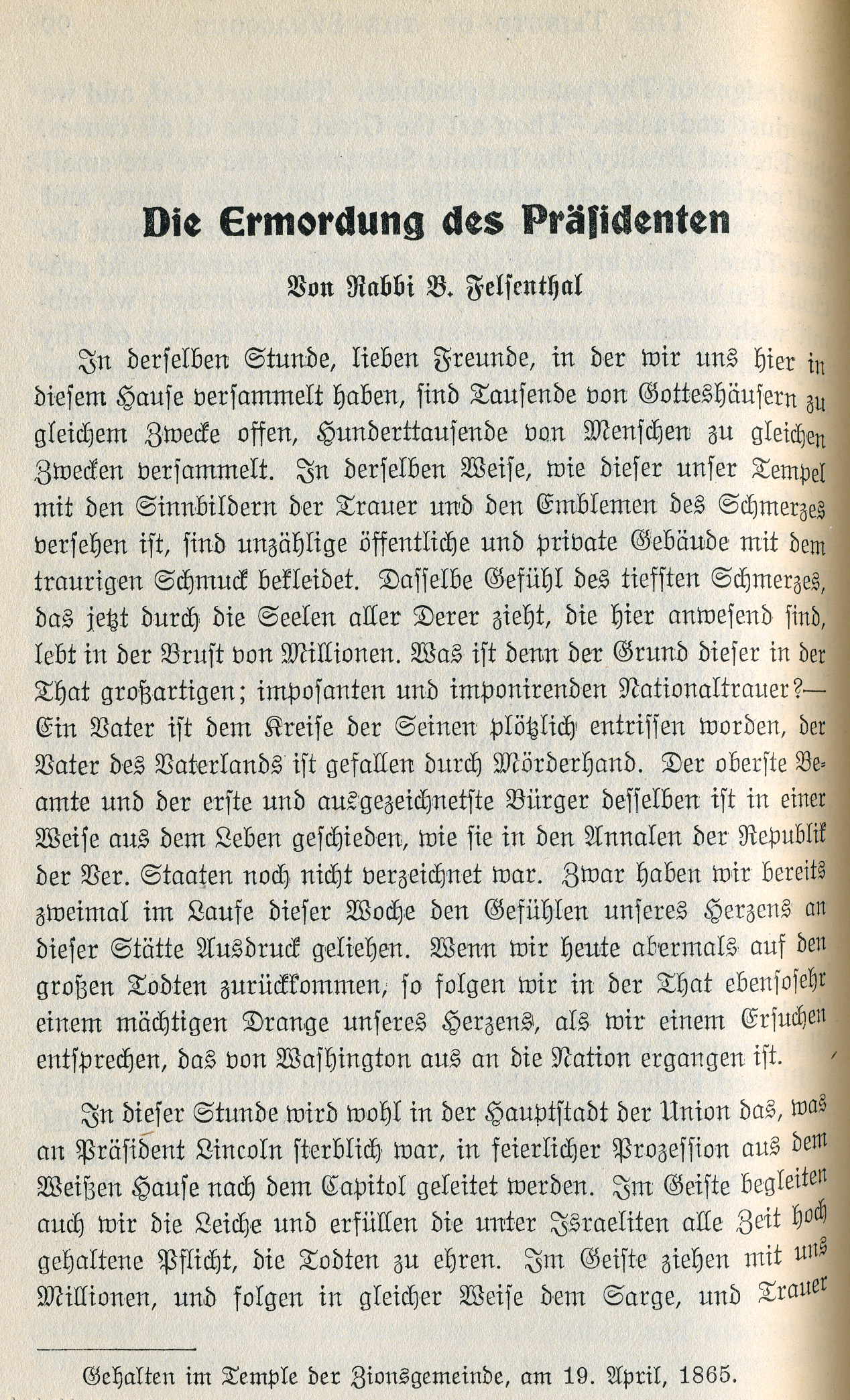
-
Description
Sermon delivered at Zion Temple on 19 April 1865. English translation by Alisa Rethy.
-
Source
American Jewish Archives. Translation by Alisa Rethy.
-
Rights
Use of this item for research, teaching and private study is permitted with proper citation and attribution.
-
Creator
Bernhard Felsenthal
-
Date
April 19, 1865
from Apr. 18, 1865
D.C. Forney to Marshal Lamon
-
Full Title
Letter signed D.C. Forney, Daily Morning Chronicle Office, Washington, D.C., to Marshal Lamon, April 18, 1865
-
Description
States, "The bearer, Mr. Lenley, one of our Reporters, is desirous of procuring a Card of admission for the Presidential Mansion, for to-morrow morning, with a view of preparing a description of the funeral arrangements. Can you oblige us by furnishing him with the means of admission. . . ."
-
Source
George R. Harrington Papers, Missouri History Museum Archives, St. Louis.
-
Rights
Please contact the Missouri History Museum at photo@mohistory.org for permission to publish this resource.
-
Tags
-
Cite this Item
Forney, D.C.. "Letter signed D.C. Forney, Daily Morning Chronicle Office, Washington, D.C., to Marshal Lamon, April 18, 1865". Remembering Lincoln. Web. Accessed December 15, 2025. https://rememberinglincoln.fords.org/node/541
from Apr. 18, 1865
Letter signed D.C. Forney, Daily Morning Chronicle Office, Washington, D.C., to Marshal Lamon, April 18, 1865
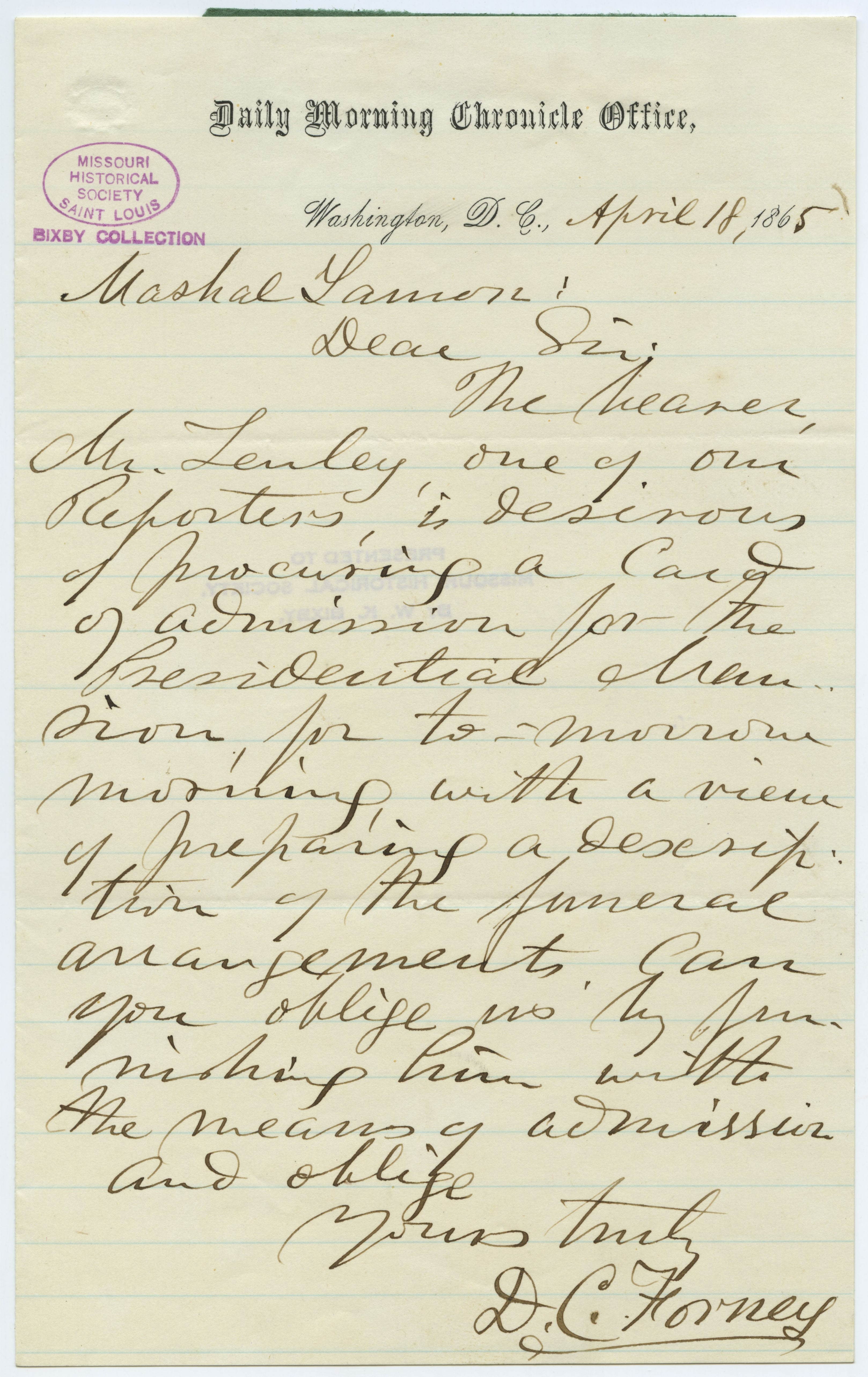
-
Description
States, "The bearer, Mr. Lenley, one of our Reporters, is desirous of procuring a Card of admission for the Presidential Mansion, for to-morrow morning, with a view of preparing a description of the funeral arrangements. Can you oblige us by furnishing him with the means of admission. . . ."
-
Source
George R. Harrington Papers, Missouri History Museum Archives, St. Louis.
-
Rights
Please contact the Missouri History Museum at photo@mohistory.org for permission to publish this resource.
-
Creator
Forney, D.C.
-
Date
April 18, 1865
from Apr. 18, 1865
Telegram of W.P. Smith, April 18, 1865
-
Full Title
American Telegraph Company telegram of W.P. Smith, Balio. [Baltimore], to Hon. Geo. Harrington [Geo. Harrington], 301 D St., April 18, 1865
-
Description
States, "Our Rail Road Connections north and west of us are Pressing me for information as to route of remains & escort from Washn. to Springfield & whether it is Contemplated to stop over at principal Points to allow People to pay respects to deceased. Won't you please give me earliest information today . . . ."
-
Source
George R. Harrington Papers, Missouri History Museum Archives, St. Louis.
-
Rights
Please contact the Missouri History Museum for permission to publish this resource.
-
Tags
-
Cite this Item
Smith, William P.. "American Telegraph Company telegram of W.P. Smith, Balio. [Baltimore], to Hon. Geo. Harrington [Geo. Harrington], 301 D St., April 18, 1865". Remembering Lincoln. Web. Accessed December 15, 2025. https://rememberinglincoln.fords.org/node/540
from Apr. 18, 1865
American Telegraph Company telegram of W.P. Smith, Balio. [Baltimore], to Hon. Geo. Harrington [Geo. Harrington], 301 D St., April 18, 1865
![American Telegraph Company telegram of W.P. Smith, Balio. [Baltimore], to Hon. Geo. Harrington [Geo. Harrington], 301 D St., April 18, 1865](https://rememberinglincoln.fords.org/sites/default/files/A0653_32_1.jpg)
-
Description
States, "Our Rail Road Connections north and west of us are Pressing me for information as to route of remains & escort from Washn. to Springfield & whether it is Contemplated to stop over at principal Points to allow People to pay respects to deceased. Won't you please give me earliest information today . . . ."
-
Source
George R. Harrington Papers, Missouri History Museum Archives, St. Louis.
-
Rights
Please contact the Missouri History Museum for permission to publish this resource.
-
Creator
Smith, William P.
-
Date
April 18, 1865
from Apr. 17, 1865
Order of procession of the funeral of Abraham Lincoln
-
Full Title
Order of procession of the funeral of the late President [Abraham Lincoln], as directed by order of the Secretary of War, Washington, April 17, 1865
-
Transcription
Official arrangements at Washington for the funeral solemnities of the late Abraham Lincoln, President of the United States, who died at the seat of Government on Saturday the 15th. day of April 1865.
War Department
Adjutant General’s Office
Washington, April 17, 1865
The following order of arrangement is directed.
Order of the Procession.
Funeral escort-in column of march.
One Regiment of Cavalry
Two Batteries of Artillery
Battalion of Marines
Two Regiments of Infantry
Commander of Escort and Staff.
Dismounted officers of Marine Corps, Navy and
Army in the order named.
Mounted officers of Marine Corps, Navy and
Army in the order named.
All military officers to be in uniform with side arms.
Civic Procession
The troops designated to form the escort will assemble in the Avenue, north of the President’s House and form line precisely at 11 o’clock a.m. on Wednesday the 19th instant with the left resting on 15th Street. The procession will move precisely at 2 o’clock P.M. when minute guns will be fired by detachments of Artillery stationed near St. John’s church the City Hall and at the Capitol. At the same hour the bells of the several churches in Washington, Georgetown and Alexandria will be tolled.
As sun-rise on Wednesday the 19th instant a Federal salute will be fired from the military stations in the vicinity of Washington, minute guns between the hours of twelve and three o’clock, and a national salute at the setting of the sun.
The usual badge of mourning will be worn on the left arm and on the hilt of the swords.
By order of the Secretary of War
W. A. Nichols
Assistant Adjutant General.
-
Source
George R. Harrington Papers, Missouri History Museum Archives, St. Louis.
-
Rights
Please contact the Missouri History Museum at photo@mohistory.org for permission to publish this resource.
-
Tags
-
Cite this Item
Nichols, W. A.. "Order of procession of the funeral of the late President [Abraham Lincoln], as directed by order of the Secretary of War, Washington, April 17, 1865". Remembering Lincoln. Web. Accessed December 15, 2025. https://rememberinglincoln.fords.org/node/539
from Apr. 17, 1865
Order of procession of the funeral of the late President [Abraham Lincoln], as directed by order of the Secretary of War, Washington, April 17, 1865
![Order of procession of the funeral of the late President [Abraham Lincoln], as directed by order of the Secretary of War, Washington, April 17, 1865](https://rememberinglincoln.fords.org/sites/default/files/A0653_27_1.jpg)
-
Source
George R. Harrington Papers, Missouri History Museum Archives, St. Louis.
-
Rights
Please contact the Missouri History Museum at photo@mohistory.org for permission to publish this resource.
-
Creator
Nichols, W. A.
-
Date
April 17, 1865
from Apr. 17, 1865
Joseph B. Steen to George H. Harrington
-
Full Title
Letter signed Jos. B. Steen [Joseph B. Steen], J.R. Duncan et al., Washington, D.C., to Hon. Geo. H. Harrington, April 17, 1865
-
Description
States that Citizens of Kentucky would like to participate in the funeral ceremonies of Abraham Lincoln.
-
Transcription
Washington DC
April 17th 1865
Hon. Gen. H. Harrington
Dear Sir,
In obedience
to an adjoined meeting of the citizens
of Kentucky to assemble and make suit.
able arrangements to participate in the
funeral ceremonies of Abraham Lincoln
late president of the United States
the undersigned were appointed a
committee to confer with you and
ascertain whether any particular
pillars of ceremony were resolved upon-
and if so. what was the order of
the same. so as to make our actions
harmonize with. and confess to. the
General Programme,
She therefore request you
will be so good as to give as any
information or directions you may deem
proper on that subject of your
earliest convenience. and oblige
Your [[?]] servant
Jos B Steen
J R Duncan
[[?]]Shaffner
Special Committee
[Transcription Team: Jaeger K., Dwight S., Gabriel Z.]
[New Hampton Middle School, New Hampton, Iowa] -
Source
George R. Harrington Papers, Missouri History Museum Archives, St. Louis.
-
Rights
Please contact the Missouri History Museum at photo@mohistory.org for permission to publish this resource.
-
Tags
-
Cite this Item
Steen, Joseph B.. "Letter signed Jos. B. Steen [Joseph B. Steen], J.R. Duncan et al., Washington, D.C., to Hon. Geo. H. Harrington, April 17, 1865". Remembering Lincoln. Web. Accessed December 15, 2025. https://rememberinglincoln.fords.org/node/538
from Apr. 17, 1865
Letter signed Jos. B. Steen [Joseph B. Steen], J.R. Duncan et al., Washington, D.C., to Hon. Geo. H. Harrington, April 17, 1865
![Letter signed Jos. B. Steen [Joseph B. Steen], J.R. Duncan et al., Washington, D.C., to Hon. Geo. H. Harrington, April 17, 1865](https://rememberinglincoln.fords.org/sites/default/files/A0653_24_1.jpg)
-
Description
States that Citizens of Kentucky would like to participate in the funeral ceremonies of Abraham Lincoln.
-
Source
George R. Harrington Papers, Missouri History Museum Archives, St. Louis.
-
Rights
Please contact the Missouri History Museum at photo@mohistory.org for permission to publish this resource.
-
Creator
Steen, Joseph B.
-
Date
April 17, 1865
from Apr. 16, 1865
W.A. Nichols to George W. Harrington
-
Full Title
Letter signed W.A. Nichols, War Department, Adjutant General's Office, Washington, to Hon. G.W. Harrington, Asst. Secy. of the Treasury, Washington, D.C., April 16, 1865
-
Description
States, "I have the honor to acknowledge the receipt of your note of this date, stating that the Secy. of War had designated me as one, on part of the Army, to confer in relation to the funeral ceremonies of the late President. As requested I will be present at the meeting fixed at the hour of 5 O'Clk P.M. to-day. . . ."
-
Source
George R. Harrington Papers, Missouri History Museum Archives, St. Louis.
-
Rights
Please contact the Missouri History Museum at photo@mohistory.org for permission to publish this resource.
-
Tags
-
Cite this Item
Nichols, W.A.. "Letter signed W.A. Nichols, War Department, Adjutant General's Office, Washington, to Hon. G.W. Harrington, Asst. Secy. of the Treasury, Washington, D.C., April 16, 1865". Remembering Lincoln. Web. Accessed December 15, 2025. https://rememberinglincoln.fords.org/node/537
from Apr. 16, 1865
Letter signed W.A. Nichols, War Department, Adjutant General's Office, Washington, to Hon. G.W. Harrington, Asst. Secy. of the Treasury, Washington, D.C., April 16, 1865
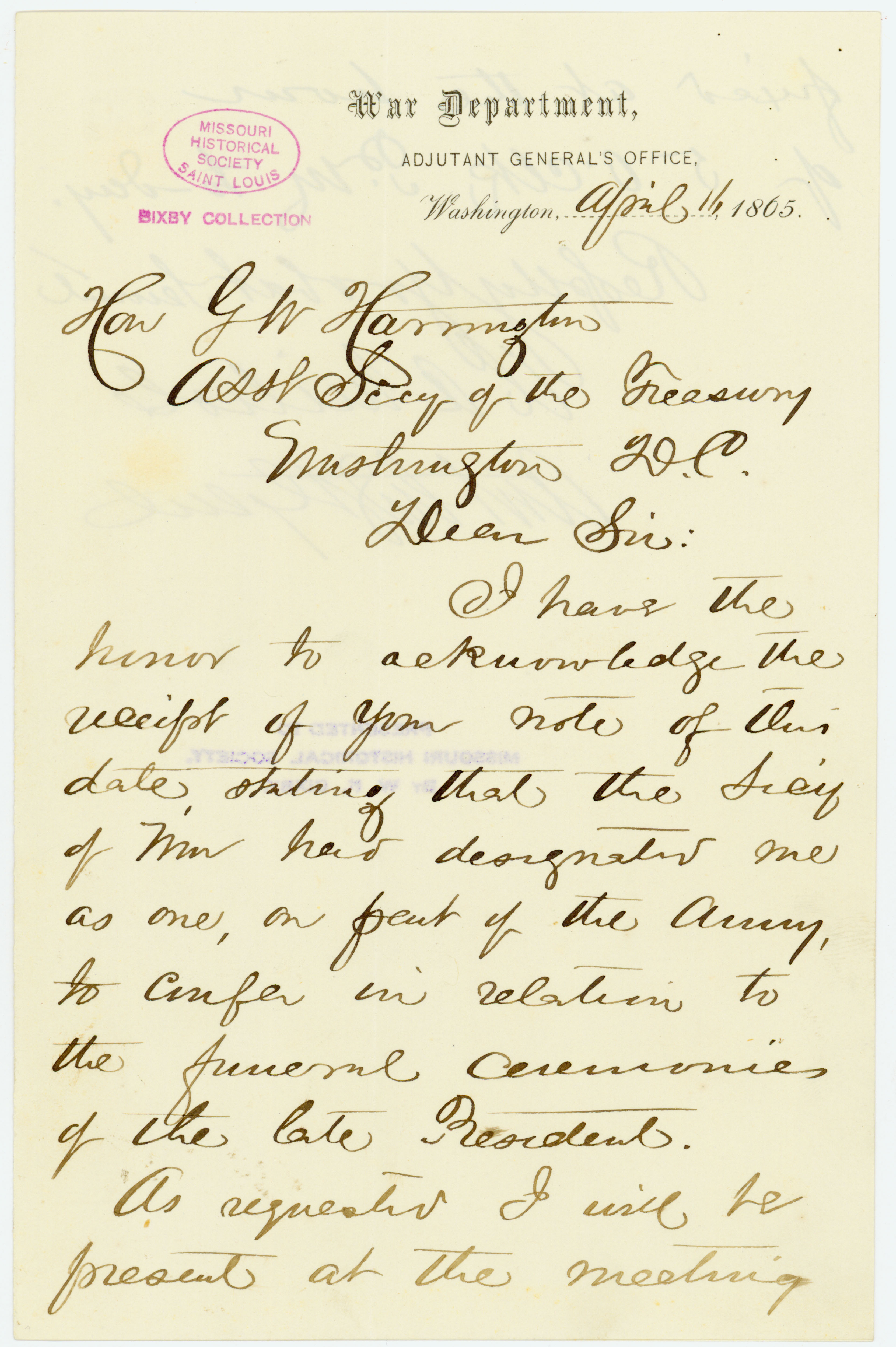
-
Description
States, "I have the honor to acknowledge the receipt of your note of this date, stating that the Secy. of War had designated me as one, on part of the Army, to confer in relation to the funeral ceremonies of the late President. As requested I will be present at the meeting fixed at the hour of 5 O'Clk P.M. to-day. . . ."
-
Source
George R. Harrington Papers, Missouri History Museum Archives, St. Louis.
-
Rights
Please contact the Missouri History Museum at photo@mohistory.org for permission to publish this resource.
-
Creator
Nichols, W.A.
-
Date
April 16, 1865
from Apr. 19, 1865
Resolution, 7th Ward, Philadelphia
-
Full Title
Resolution passed by the 7th Ward of the City of Philadelphia relating to the assassination of the late President Lincoln, April 19, 1865
-
Source
George R. Harrington Papers, Missouri History Museum Archives, St. Louis.
-
Rights
Please contact the Missouri History Museum at photo@mohistory.org for permission to publish this resource.
-
Tags
-
Cite this Item
Barr, John. "Resolution passed by the 7th Ward of the City of Philadelphia relating to the assassination of the late President Lincoln, April 19, 1865". Remembering Lincoln. Web. Accessed December 15, 2025. https://rememberinglincoln.fords.org/node/536
from Apr. 19, 1865
Resolution passed by the 7th Ward of the City of Philadelphia relating to the assassination of the late President Lincoln, April 19, 1865
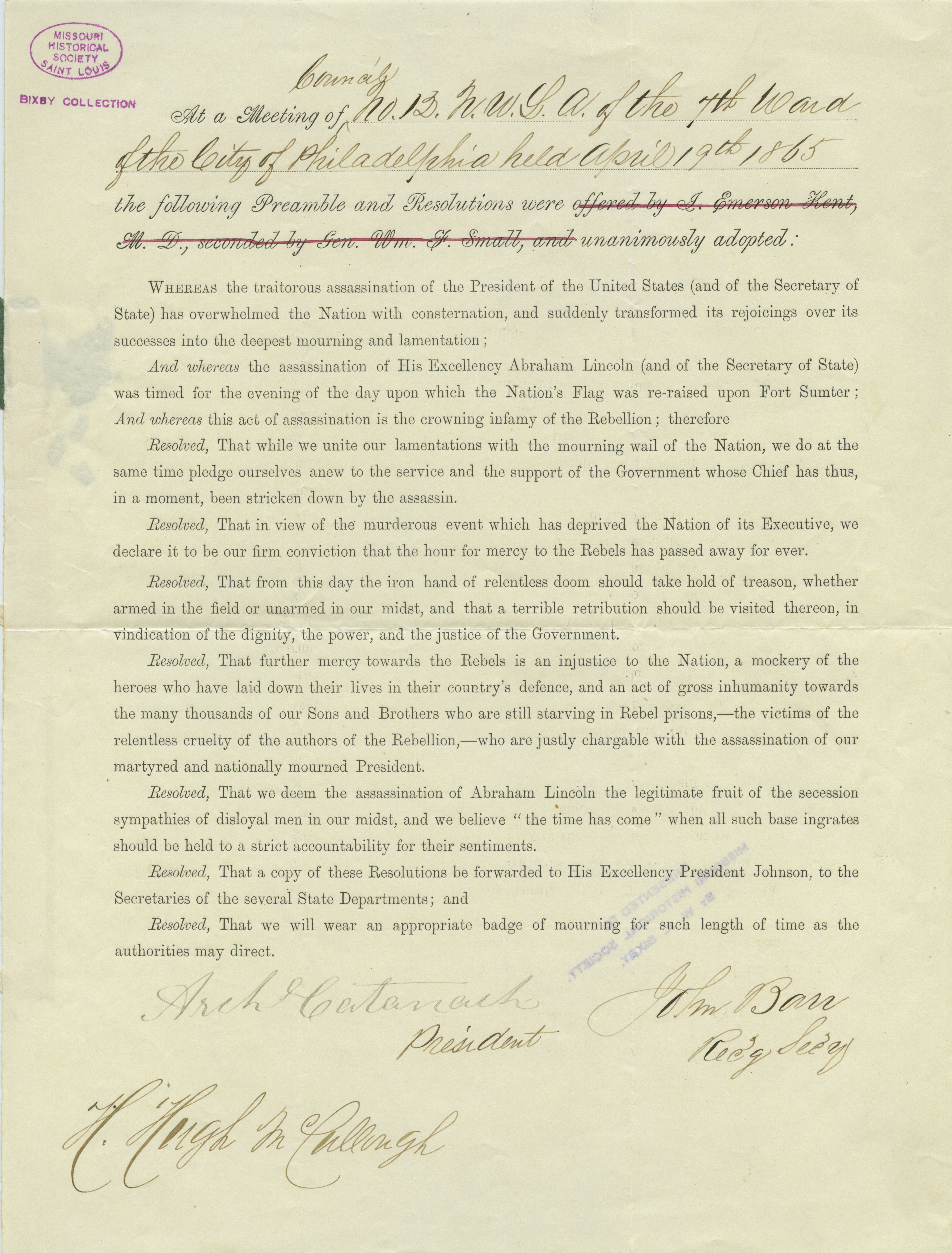
-
Source
George R. Harrington Papers, Missouri History Museum Archives, St. Louis.
-
Rights
Please contact the Missouri History Museum at photo@mohistory.org for permission to publish this resource.
-
Creator
Barr, John
-
Date
April 19, 1865
from Apr. 18, 1865
W.A. Nichols to George Harrington
-
Full Title
Letter signed W.A. Nichols, Asst. Adj. Genl., War Department, Adjutant General's Office, Washington, to Hon. Geo. Harrington [George Harrington], Asst. Secty. of U.S. Treasy., April 18, 1865
-
Description
States, "Will you please inform me at what hour to-day it will most convenient for the officers of the Army to view the remains of the deceased President. . . ."
-
Source
George R. Harrington Papers, Missouri History Museum Archives, St. Louis.
-
Rights
Please contact the Missouri History Museum at photo@mohistory.org for permission to publish this resource.
-
Tags
-
Cite this Item
Nichols, W. A.. "Letter signed W.A. Nichols, Asst. Adj. Genl., War Department, Adjutant General's Office, Washington, to Hon. Geo. Harrington [George Harrington], Asst. Secty. of U.S. Treasy., April 18, 1865". Remembering Lincoln. Web. Accessed December 15, 2025. https://rememberinglincoln.fords.org/node/535
from Apr. 18, 1865
Letter signed W.A. Nichols, Asst. Adj. Genl., War Department, Adjutant General's Office, Washington, to Hon. Geo. Harrington [George Harrington], Asst. Secty. of U.S. Treasy., April 18, 1865
![Letter signed W.A. Nichols, Asst. Adj. Genl., War Department, Adjutant General's Office, Washington, to Hon. Geo. Harrington [George Harrington], Asst. Secty. of U.S. Treasy., April 18, 1865](https://rememberinglincoln.fords.org/sites/default/files/A0653_35.jpg)
-
Description
States, "Will you please inform me at what hour to-day it will most convenient for the officers of the Army to view the remains of the deceased President. . . ."
-
Source
George R. Harrington Papers, Missouri History Museum Archives, St. Louis.
-
Rights
Please contact the Missouri History Museum at photo@mohistory.org for permission to publish this resource.
-
Creator
Nichols, W. A.
-
Date
April 18, 1865

